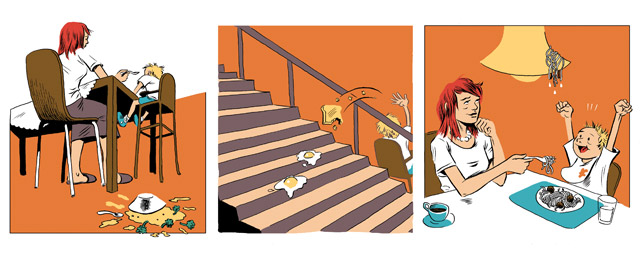To hear the public-health experts tell it, family meals are worth their weight in gold. Researchers point to the fact that children who eat regularly with their families do better in school, have better manners and delay having sex. They are less likely to smoke, drink, do drugs, get depressed, develop eating disorders — or commit suicide. They are more likely to eat vegetables and foods high in calcium and to glow inside and out like little human fireflies.
So, it’s too bad that my 2-year-old spent last night at dinner groaning: “Me free. Me freeeeeee. No food. No food. Meee freeeee.”
Of course, the word set — as in “set me free” — was implied, like the chorus of a song. The chorus of a song celebrating the pointless tortures of a teeny-tiny political prisoner stuck on a rocky point surrounded by cruel guards.
This morning, I found a slice of raisin toast she somehow spirited away and hid beneath her potty. Meanwhile, her 4-year-old brother has perfected a new trick: taking food off his plate and, keeping his hand close to his face, lobbing it with a sort of overhand magician’s gesture so it flies in a majestic arc away from his chair and disappears down a nearby open staircase.
He’s also adept at turning his body into a suddenly boneless pool of jelly and slipping down under the table like protoplasm. He has developed the
fascinating strategy of eating cheese by individual atoms, masticating each atom so thoughtfully and thoroughly that eating a single checker-size piece of cheese can stretch to an hour. He eats only about 10 things, by the way — most of them cheese, Cheerios and hard-
boiled eggs.
Because of this eccentric diet, a good part of every one of our glorious family meals is spent trying to get him to eat other things. And so, on the advice of pediatricians, feeding therapists, chiropractors, nutritionists and so forth, we work on expanding the foods he eats into similar, but new, foods. And nearly every day I enjoy making scrambled eggs for him to lob down the stairs.
As near as I can tell, the real promise of family mealtime goes something like this: Start early and, with everyday practice, your child will soon learn to outwit and exhaust his parents, so that by the time he gets to high school, common pursuits such as smoking and drinking will have no appeal, freeing him up for loftier pursuits like taking a semester abroad so that no public-health researchers can survey what he’s up to.
One thing few public health thinkers seem to have tracked is what benefits accrue to parents involved in family meals. So I’ll volunteer a few for the public record. For one thing, it’s improved my own problem-solving abilities. Sometimes when I’m spot-cleaning scrambled eggs off the carpet on the stairs while conducting an on-air radio interview about the new hot restaurants, I can actually feel my brain creating new little synapses and connections as I scrub.
Moreover, as a food critic (sometimes thought to be a snobby job), I’ve found that enduring these challenges has rendered me more publicly likeable. I was recently emceeing a celebrity chef cooking contest, the kind during which chefs have an hour to prepare meals based on a mystery ingredient unveiled at the last second. The competition was for charity and was arranged so that the winners of the various cooking battles would proceed to cook off against one another, all of which meant that I was compelled to blather on almost ceaselessly for two straight days.
One of the judges at the competition got wind of the fact that my 4-year-old eats not a single yuppie prestige food (no raw milk goat cheese and, for that matter, no goats) and quizzed me about it onstage, on and off, for hours: “So, you’re a fancy food critic and your child doesn’t eat?”
It was great conversational fodder. And afterward, women in the crowd came up to me to whisper, “Mine won’t eat either.”
My interest in family mealtimes has also broadened my understanding of culinary history. For instance, here’s some oat trivia: In old-time Scotland, families would fill a big iron pot with coarsely milled oatmeal, cook it over the fire in the hearth and then dump the contents into a big “porridge drawer.” The porridge would cool and harden, and then could be eaten all week long. Leftover slices of porridge would be fried in butter or fat to serve with the evening meal (these crisp slices were called “calders”), but cold porridge slices were also simply carried off to the fields or work in lunch pails much as we carry a granola bar.
More oat trivia: Newborn babies in Scottish farmhouses were said to be kept in baskets above the porridge drawer so they would be warmed by the hot porridge. Mix porridge with water and you get gruel, which was Scottish babies’ first food, and also the main diet of the elderly.
I learned this all late one night on the Internet when I was trying to figure out if my 4-year-old’s preference for Cheerios three times a day was a problem. No! But if he starts wearing a kilt, I’ll know why.
If I want to be dead honest about it, I probably should confess that what bothers me most about family mealtime is how much it wounds my own ego: Deep down, I fancy myself a good cook with a complex grasp of nutrition and more than passable table manners. But eight out of every 10 meals I prepare are greeted with horror. The dish as eaten by the tots contains nary a plant in a recognizable state, and we might as well tidy up the after-dinner kitchen with a fire hose.
But I’ll keep at it. Every once in a while, my little girl will eat so many carrots with hummus that I feel like she’s posing for secret HealthToday videographers, and my big guy will chatter out a story about Yellowtail Jacks living in an ocean cave while actually feeding himself some yogurt. And in these rare moments, it feels like this family meal thing might not just kill us all.
I’ve come to think of family meals as a practice, much as one might practice yoga or meditation: It’s probably the journey, and not the destination, that matters most. Although health experts will tell you that family mealtime is worth more than a treasure chest filled with gold and rubies, I’d still rather have rubies on the stairs than scrambled eggs. But as I tell my kids, “What’s being served is what’s being served.” And that’s OK.
Dara Moskowitz Grumdahl is a celebrated food and wine critic. She is the winner of five James Beard Foundation awards — the Oscars of the food world. Her new book is Drink This: Wine Made Simple (Ballantine, 2009).


This Post Has 0 Comments